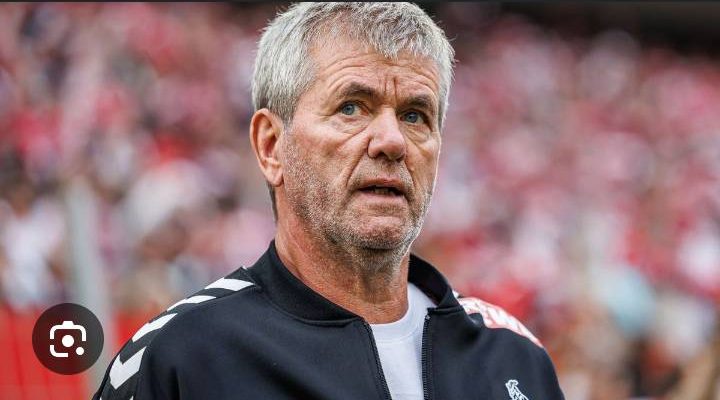Funkel’s name is woven into the fabric of German football—first as a player, later as a coach. He was born on 10 December 1953 in Neuss and began his professional playing career as a midfielder at Bayer 05 Uerdingen around 1973, eventually moving to 1. FC Kaiserslautern between 1980 and 1983 and returning to Krefeld thereafter. In total he amassed 320 Bundesliga appearances with 83 goals as a player.
After hanging up his boots, Funkel embarked on a coaching career that would lead to multiple promotions into the Bundesliga—a record number. He became known for his ability to steady clubs in crisis, his hard‑nosed pragmatism, his “retter” (rescuer) identity when teams were in trouble. A man who rarely played stylish football, but very often got results.
His time at 1. FC Köln is particularly memorable. He coached the team and helped secure their return to the Bundesliga, stepping in when things were tough and guiding them back. One image remains: Funkel in the black‑and‑white of Cologne, surrounded by fans, hat askew, drenched in beer and joy after promotion.
But now comes the blow: the news that Funkel has been hospitalised with a serious illness. For many fans and observers, the shock is profound. Because Funkel has always been the picture of grit, resilience, the “steady hand” on the tiller. To see him facing his own biggest challenge is unsettling.
Imagine the scene: the tributes from fans, the memories of his leadership, his final‑whistle glances, the celebrations, the relief at survival, the champagne showers, the hugs with players. And now that same figure lying in hospital, away from the floodlights, away from the tactics board, stripped of the daily grind he mastered for decades. The contrast is stark.
For the supporters of the FC, for the German football community, this is not just about a former coach’s health. It touches on identity, memory, loyalty. Funkel meant something: he symbolised that if you work hard, if you accept the mess, if you trust the fundamentals, you can survive. He was the veteran coach who didn’t shy away from the ugly battle, the collapsed season, the relegation fight. And now we’re reminded: he’s also human, he’s vulnerable.
It evokes countless stories. Some of the players whose careers he saved. The teams he pulled back from the brink. His calm in the storm. The way he’d say, “Ich muss mich gesund fühlen – wenn das so bleibt, dann schließe ich nicht aus, dass ich weitermache.” (I must feel healthy — if that remains, then I don’t exclude continuing.) (We now hope for exactly that: his health.
There are certain scenes that might play out in the coming days: colleagues visiting the hospital, former players posting well‑wishes on social media, the club (1. FC Köln) issuing a statement, the public holding its breath. There will be reflections on his legacy. Interviews digging up old quotes, footage of his time on the touchline. People will speak of “Funkel‑Zeiten”. Children who grew up watching him as manager, now grown up themselves.
It also forces reflection on football’s human side. Often we see the trophies, the celebrations, the media sound‑bites. But rarely do we think of the men behind the bench, the hours of travel, the stress, the health toll. Coaches at 65, 70, 71 years old like Funkel still working at elite level — the burdens are heavy. And this moment puts that into sharp focus.
For the fans of the FC, for every person who cheered Funkel’s ascent, this is a moment of vulnerability. But also one of hope. Hope that the man who inspired so many will now receive the care, rest, support he needs. Hope that this illness is not overwhelming, that there will be a recovery story. And hope that the football world will rally around him.
A fitting way to think of it is to go back to one of his many rescues: When the FC were in trouble, fans whispered “Bring in Funkel”, meaning bring in experience, stability, someone who knows how to fight. Now the roles are reversed: the fight is his. And the football community stands by him.
In many ways it is poetic: He has spent his career working with teams who were down, turning around seasons, re‑motivating groups. He has faced games where the pressure was unbearable, the stadium turned hostile, the expectations sky‑high. And now, we ask: when the man himself is under pressure, who turns the board around? Who supports him? Fortunately, we all can.
There is also something quietly beautiful in this moment: A club icon, a storied coach, connected to so many players, clubs, fans — and now he is humanised, not by scandal or defeat, but by a personal health crisis. It reminds us that beneath the suit, the voice, the public image, there is a human life, a family, a story that goes beyond the scoreboard.
If I were writing ahead, I would hope for these outcomes: open updates from the club/family about his condition. Public messages of support from former players, clubs he worked at. Possibly a reduced football‑role (ambassador, mentor) for Funkel once he recovers. A moment in a match at the FC — a tribute, applause for their former coach. A moment of unity, rather than division, in the football culture.
In your words: the shock‐waves that ripple through the football world are real. Fans are fassungslos (speechless), and rightly so. The man who seemed indefatigable now faces his own greatest test. It feels personal because in a sense, Funkel is “our” coach—our generation’s uncertainty about the future, the fragility of success, the humanity behind the sport we love.
What matters now is not tactics, not league tables, not transfer rumours. What matters is health. What matters is recovery. What matters is letting the man who carried teams now receive support. Whether he comes back stronger, whether he steps aside and becomes a figure behind the scenes, whether he takes time off — all of that matters. But foremost: that he recovers, that he feels the support of those fans, those clubs, those who respect him.
For the FC faithful: remember his achievements, yes — the promotions, the crucial wins, the fight. But also now remember him as a person deserving of care. The next time you see him on a pitch side, or on TV, or in an interview, you might see something different: a moment of frailty, of reflection, of gratitude.



